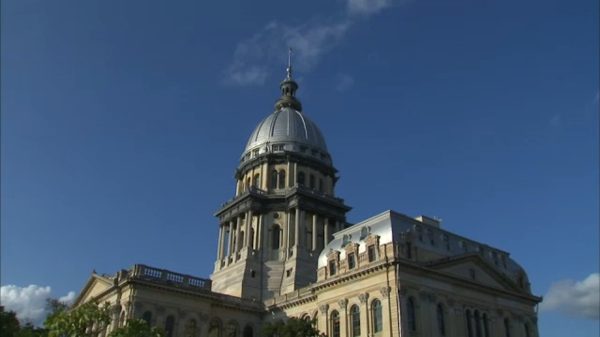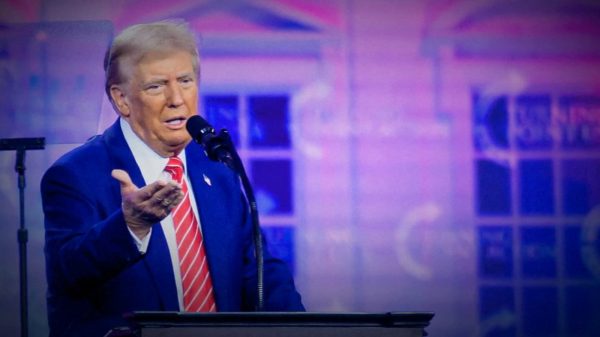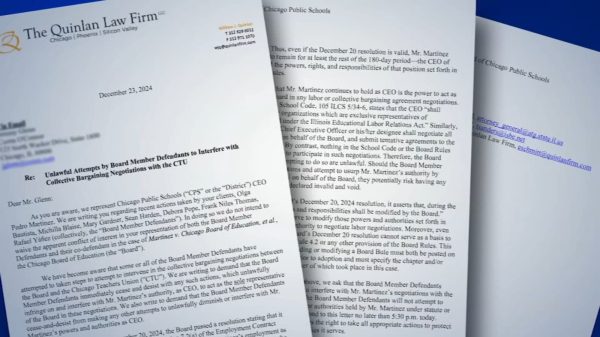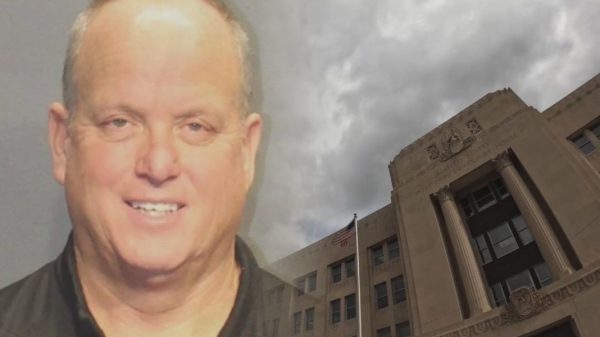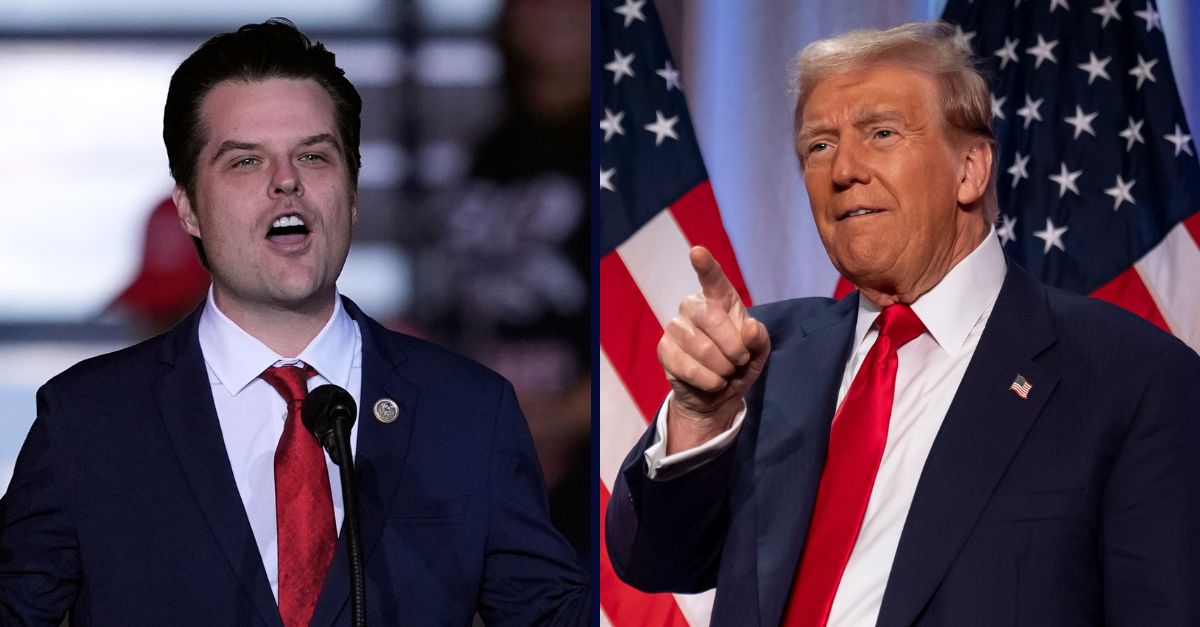
Left: Rep. Matt Gaetz, R-Fla., speaks before Republican presidential nominee former President Donald Trump speaks at a campaign rally at Lee’s Family Forum, Thursday, Oct. 31, 2024, in Henderson, Nev. (AP Photo/Evan Vucci). Right: President-elect Donald Trump arrives to speak at a meeting of the House GOP conference, Wednesday, Nov. 13, 2024, in Washington. (AP Photo/Alex Brandon)
President-elect Donald Trump’s incoming administration is starting to take shape, with high-profile loyalists apparently being granted high-ranking roles.
Trump’s announcement that he plans to pick Matt Gaetz as the next U.S. attorney general has also raised many eyebrows, as Gaetz has been the target of numerous investigations and was the subject of an ongoing House Ethics Committee probe when he abruptly resigned from Congress.
Gaetz has yet to be formally charged with any crime and has denied any wrongdoing on his part, calling the DOJ investigation a “smear” campaign against him. If he is indeed confirmed by the Senate, Gaetz could join the darker history of attorneys general who faced serious criminal accusations.
As I wrote about in my new book “Corporatocracy,” Harry Daugherty was accused 100 years ago of crimes while he was attorney general. Daugherty was Warren G. Harding’s attorney general. He got that job as a “thank you” for running Harding’s successful campaign for the presidency. Daugherty was the one who predicted that the Republican National Convention would deadlock in 1920 and that the nominee would be chosen by powerful men “in a smoke-filled room.”
Indeed, Harding was that man.
Daugherty showed up at DOJ for his new job with a colleague named Jess Smith. Historians accuse Smith of running crimes right out of the Department of Justice as well as at a nearby speakeasy in Washington, D.C., on K Street known as the Little Green House. President Harding was known to frequent the Little Green House, where illegal gambling and illegal liquor were available. Smith was accused of a range of crimes from selling pardons to selling licenses to produce alcohol during Prohibition.
Smith, Daugherty and Harding were derisively called the “Ohio Gang” and were suspected of either being in on — or turning a blind eye to — many crimes, including the bribery at the heart of the Teapot Dome Scandal wherein Harding’s secretary of the interior took bribes from oilmen to access oil reserves. Smith killed himself as suspicions swirled around him, and Harding died in the middle of his presidential term on a trip to San Francisco. That left Daugherty, who was fired by President Calvin Coolidge, who became president after Harding’s death.
In 1926 Daugherty was indicted for his alleged role in the sale of seized American assets of a German-owned company during World War I. But while he faced criminal trials, juries in both of his cases deadlocked, and Daugherty went free.
Fifty years ago, the United States had another campaign manager turned attorney general who was charged criminally named John Mitchell. Mitchell was Richard Nixon’s campaign manager in 1968 when Nixon won the White House. Mitchell was both attorney general and campaign manager of the Committee to Re-Elect the President — known as CREEP — in 1972. CREEP was at the center of the welter of crimes collectively known as Watergate. CREEP raised illegal corporate campaign funds for the 1972 campaign. CREEP also paid for other crimes with the criminal campaign money like breaking into the office of Daniel Ellsberg’s psychiatrist Dr. Lewis Fielding as well as breaking into the DNC’s headquarters at the Watergate building (hence the name of the scandal).
Mitchell’s colorful wife Martha Mitchell was one of the whistleblowers in Watergate who hinted to the press that her husband’s behavior during the 1972 campaign and in the subsequent help to cover up Watergate was all done at Nixon’s request and direction. This later became known as the Martha Mitchell effect, because much like the mythical Cassandra, even though few believed her at the time, she was telling the hard truth.
A federal grand jury that tried to indict Nixon for his role concluded that Mitchell was up to his eyeballs in the cover-up of Watergate by paying off the burglars to be quite instead of truthful. Nixon was deemed an unindicted coconspirator instead of being charged as a sitting president.
In 1974 a federal grand jury indicted Mitchell, as well as other Nixon aides, of conspiracy, obstruction of justice, making false statements to the FBI, making false statements to the grand jury and perjury. Mitchell was the first attorney general in American history to be found guilty of a crime. He was sentenced to 2.5 to 8 years behind bars. He ended up serving 19 months.
Will Gaetz join this rogues’ gallery of AGs? In 2023 the DOJ declined to prosecute Gaetz after ending its investigation of him for alleged sex trafficking. But the House Ethics Committee put out a statement earlier this year that “the Committee is reviewing allegations pursuant to Committee Rules 14(a) (3) and 18(a) that Representative Gaetz may have: engaged in sexual misconduct and illicit drug use, accepted improper gifts, dispensed special privileges and favors to individuals with whom he had a personal relationship, and sought to obstruct government investigations of his conduct.”
If the nation has a controversial attorney general every 50 years, then Matt Gaetz would be right on time. But maybe the U.S. could break this pattern and pick a nominee for AG with a history free of criminal investigations and government probes.
Ciara Torres-Spelliscy is a law professor at Stetson, a Brennan Center fellow and the author of the book “Corporatocracy.”
This is an opinion piece. The views expressed in this article are those of just the author.

